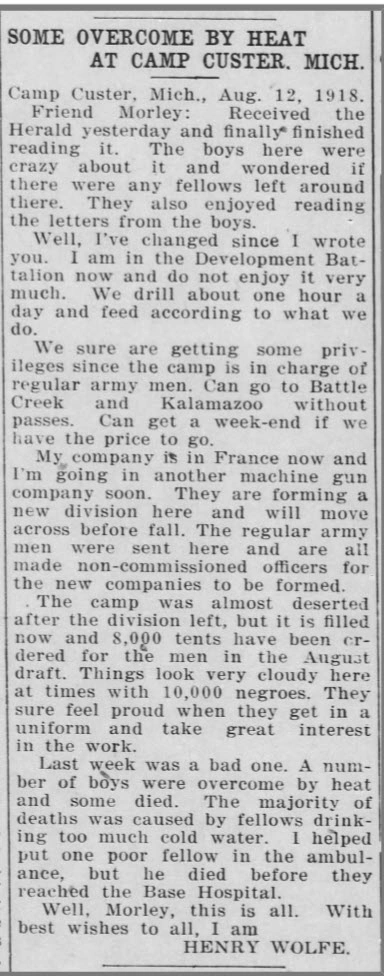Henry S. Wolfe was the first cousin of Mildred Wolfe Smith and her siblings. His father was Samuel Sherman Wolfe, and his mother was Emily Gaskill Wolfe. His parents divorced when Henry was a toddler, and Henry lived with him mother, who soon remarried. His grandfather Adam Clark Wolfe amended his will to ensure there would be money to support Henry and his sister when they were children.
Henry S. Wolfe graduated from Angola High School in 1916, and was then employed in Hayes Wheel Works in Jackson MI until he entered the army in early 1918, during World War I. He was sent to Camp Custer, west of Battle Creek, MI, which was, I believe, a major regional army post during WWI. While there he occasionally wrote letters to his friend Morley in Angola, and the Angola Herald newspaper published at least two of the letters. Attached is a letter from August 1918, and on this page is the text of an October 1918 letter, partly about the efforts at Camp Custer to combat the epidemic of Spanish Flu. Sadly, as he was writing the second letter, his cousin Bessie Wolfe lay dying of Spanish Flu, which she contracted while working in Jackson, MI.
Henry would later serve in an elected position of Angola City Clerk/Treasurer from 1929 to 1942, and then for several years as the Veterans’ Service Officer in Angola, where he was responsible for assisting area military veterans. Despite the absence of his Wolfe father while growing up, he seems to have maintained relations with his Wolfe relatives. The Angola Herald society page often reported on the social activities of Henry and his wife Hazel Hart Wolfe, including visits to and from the Wolfes of Litchfield, MI.

Text of Oct 11, 1918 article from the Angola Herald, Angola, IN.
RECREATION BUILDINGS USED FOR INFLUENZA PATIENTS
Camp Custer. Mich., Oct. 5. 1918.
Friend Morley: Received your paper last week and it found me O.K. Well, we are having a large amount of sickness here now, but not near as much as we would have had if we had not been prepared for it. We had everything ready for it before even a case broke out. Each man has to be so arranged while sleeping that he will not breathe the same air as his bunk mate. In order to prevent this we put up our phomoes so as to make a separate room like. There are also three men from the company detailed to get all fellows coughing or sneezing and take them to the hospital tent. There their throats are sprayed. This morning’s report is that there are over 4,000 cases now in camp and only nine deaths. Deaths were due to pneumonia. The hospital is full, Y. M. C. A., K of C., and Red Cross buildings at the hospital. A number of the batteries from the artillery sector have been moved and the barracks are used as hospitals. Forty-two volunteer doctors came this morning to help and relieve some of the doctors who have been working since the epidemic started. They also have a number of nurses from Battle Creek, Ann Arbor, Detroit, Jackson and Grand Rapids.
This influenza has caused many disappointments. They were trying to see how quick a division could be formed and ready for over-seas, but part of the work has stopped on the range. It sounds around here as if they were firing on Berlin. All you can here is the noise from machine guns, rifles and hand grenades.
I was offered an unlimited furlough about three weeks ago, but did not take it, thinking I would get transferred to the division and now I wish I had taken it, because there will be no transferring of men for a while. A large number of recruits was expected this month, but they will be called later.
There sure is a large number of men here now. Not room enough in barracks, so about 10,000 are in tents. They are also building more barracks so they can house 60,000 men.
Well, Morley, I just got off 24 hours’ guard duty and am tired so I will close for now. I am as ever a friend,
HENRY WOLFE
Afterword
Only a month after this article appeared, a ceasefire in Europe on November 11 would effectively end World War I. Henry S. Wolfe continued to serve in the Army until July 1919 at Camp Custer. He married in 1923 and worked as a clerk for awhile in the 1920s at the Wabash Railroad, before being elected Clerk/Treasurer of Angola in 1929.
Ted Lienhart